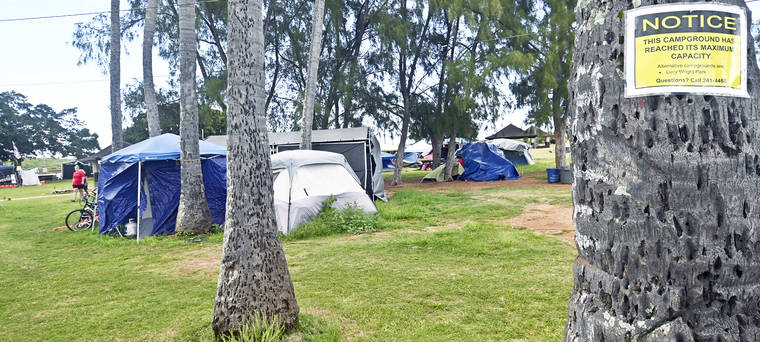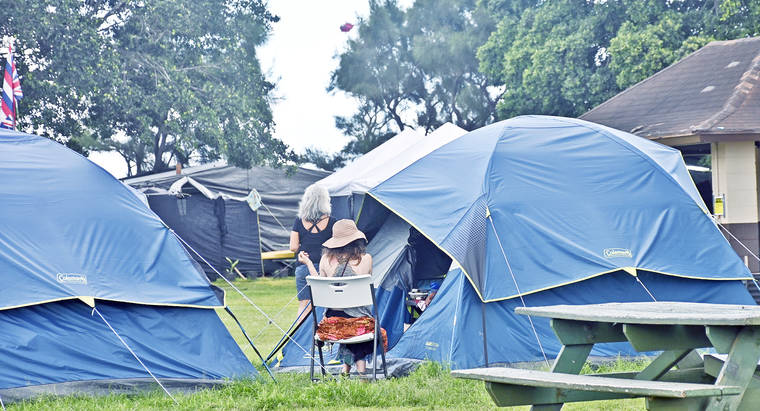LIHU‘E — A bill to define the types of campgrounds allowed on Kaua‘i is moving into the realm of the Planning Commission.
Introduced last week by Kaua‘i County Councilmembers Mason Chock and Luke Evslin, proposed draft Bill No. 2822 outlines what a developed versus undeveloped campground would be on the island, one of the main differences being what an owner can make money on.
Chock said the intent is to define uses on open-zone and agriculture-zoned properties related to commercial transient use. The bill would restrict use permits for a campground on open- or agriculture-zoned properties, allow these activities on resort- and commercial-zoned properties.
The bill defines an undeveloped campground as one used by property owners and guests for non-commercial camping. This campground would lack permanent structures and not generate compensation.
A developed campground would allow permanent structures and bathrooms, and will need to be designed to be “used, let or rented for temporary commercial occupancy by campers.”
“Developed campgrounds potentially represent a pathway for transient accommodations on ag and open land,” Evslin said, pointing to proposed camping projects that have opened his eyes to what he called a “loophole” in the county’s Comprehensive Zoning Ordinance.
Last year, a prosed glamping project in Princeville faced community backlash.
Councilmember Felicia Cowden expressed concern for the houseless community, and asked fellow councilmembers to take special care to make sure this bill would not be abused.
While the county had been allowing five beach parks as refuges for the houseless during the COVID-19 pandemic, that program is slowly being phased out over the coming months.
At the end of March, both ‘Anini and Anahola beach parks closed to camping, sending many of the 83 permitted individuals back to the streets.
“As you all know, I’ve had a lot of focus on people who have been displaced from their housing,” Cowden said. She said she supported the intent of the proposed bill, but wanted to ensure it would not be abused.
Planning Department Director Ka‘aina Hull said in his tentative review of the bill that there are rules and laws prohibiting habitating without the necessary infrastructure, like bathrooms.
The bill also stipulates that single- and multi-family transient vacation rentals on agriculture and open land, regardless of whether in or outside of the Visitor Destination Area, would be prohibited.
The council moved to send the bill to the Planning Commission in the coming months. It is not on the body’s next meeting agenda for Tuesday, April 13.
•••
Sabrina Bodon, public safety and government reporter, can be reached at 245-0441 or sbodon@thegardenisland.com.




Prohibiting People for renting their property as they please is unconstitutional. Unconstitutional in terms that it prohibits the exercise of free enterprise and deprives a person of life liberty and property without due process.
The solution is not in blanket prohibition of Airbnb or camping areas. The laws regulating the practice such as maintaining the properties in good condition so not to impact the area in which it is located in to become an abatement “devaluation of property” there laws that cover properties that are out of compliance.
Such laws should be created to protect the value, attractiveness and desirability should be implemented in order to maintain the property which the campground or airbnb land is located.
I do agree that residential areas should be confined to limited short term rentals such as no more than 3 or 4 guests at a time or more if the property or dwelling is large enough to sustain more guests.
I do not agree to limiting a short term rentals or campgrounds located on agriculturally zoned land as long as it is large enough to accommodate its guests.